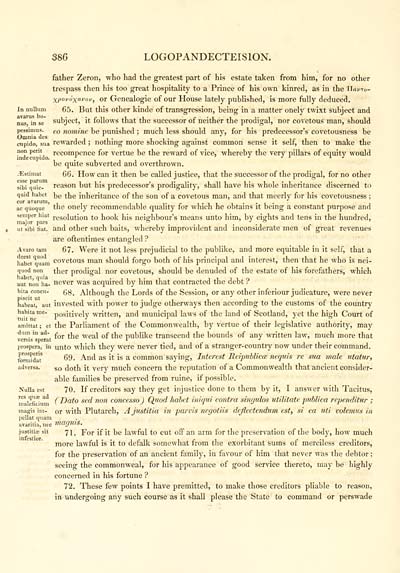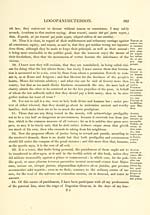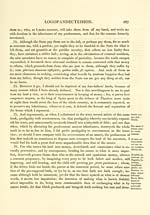Maitland Club > Works of Sir Thomas Urquhart
(432) Page 386
Download files
Complete book:
Individual page:
Thumbnail gallery: Grid view | List view

38G LOGOPANDECTEIS10N.
father Zeron, who had the greatest part of his estate taken from him, for no other
trespass then his too great hospitality to a Prince of his own kinred, as in the IWto-
xpovoxavov, or Genealogie of our House lately published, is more fully deduced.
In nullum 65. But this other kinde of transgression, being in a matter onely twixt subject and
nus in se" subject, it follows that the successor of neither the prodigal, nor covetous man, should
pessimus. eo n0 mine be punished ; much less should any, for his predecessor's covetousness be
cupido, sua rewarded ; nothing more shocking against common sense it self, then to make the
non pent recompence for vertue be the reward of vice, whereby the very pillars of equity would
be quite subverted and overthrown.
.Estimat 66. How can it then be called justice, that the successor of the prodigal, for no other
sibi quic- reason but his predecessor's prodigality, shall have his whole inheritance discerned to
quid habet De t ne inheritance of the son of a covetous man, and that meerly for his covetousness ;
cor avarum, , ._ _ . . .
ac quoque the onely recommendable quality tor which he obtains it being a constant purpose and
semper hiat rcso l u tion to hook his neighbour's means unto him, by eights and tens in the hundred,
major pars # ° t # ,..-, -
ut sibi fiat, and other such baits, whereby improvident and inconsiderate men of great revenues
are oftentimes entangled ?
Avaro tam 67. Were it not less prejudicial to the publike, and more equitable in it self, that a
habet Tuam covetous man should forgo both of his principal and interest, then that he who is nei-
quod non ther prodigal nor covetous, should be denuded of the estate of his forefathers, which
aut non ha- never was acquired by him that contracted the debt ?
bita concu- gg # Although the Lords of the Session, or any other inferiour judicature, were never
habeat, aut invested with power to judge otherways then according to the customs of the country
habname- positively written, and municipal laws of the land of Scotland, yet the high Court of
amittat ; et the Parliament of the Commonwealth, by vertue of their legislative authority, may
vetsis's erat f° r tne wea * °^ tne P u klike transcend the bounds of any written law, much more that
prospera, in un to which they were never tied, and of a stranger-country now under their command.
fonnidat 8 69. And as it is a common saying, Interest Reipublica: nequis re sua male utatur,
adversa. s0 doth it very much concern the reputation of a Commonwealth that ancient consider-
able families be preserved from ruine, if possible.
Nulla est 70. If creditors say they get injustice done to them by it, I answer with Tacitus,
'"brKu (Dato sed non concesso) Quod habet iniqui contra singidos utilitate publica rependitur ;
magisim- or with Plutarch, Ajustitia in parvis negottis deflectendum est, si ea uti volemus in
pellat quaru
avaritia, nee nuir/ms.
justitiae sit "j\ m p r if it be lawful to cut oft* an arm for the preservation of the body, how much
more lawful is it to defalk somewhat from the exorbitant sums of merciless creditors,
for the preservation of an ancient family, in favour of him that never was the debtor ;
seeing the commonweal, for his appearance of good service thereto, may be highly
concerned in his fortune ?
72. These few points I have premitted, to make those creditors pliable to reason,
in undergoing any such course as it shall please the State to command or perswade
father Zeron, who had the greatest part of his estate taken from him, for no other
trespass then his too great hospitality to a Prince of his own kinred, as in the IWto-
xpovoxavov, or Genealogie of our House lately published, is more fully deduced.
In nullum 65. But this other kinde of transgression, being in a matter onely twixt subject and
nus in se" subject, it follows that the successor of neither the prodigal, nor covetous man, should
pessimus. eo n0 mine be punished ; much less should any, for his predecessor's covetousness be
cupido, sua rewarded ; nothing more shocking against common sense it self, then to make the
non pent recompence for vertue be the reward of vice, whereby the very pillars of equity would
be quite subverted and overthrown.
.Estimat 66. How can it then be called justice, that the successor of the prodigal, for no other
sibi quic- reason but his predecessor's prodigality, shall have his whole inheritance discerned to
quid habet De t ne inheritance of the son of a covetous man, and that meerly for his covetousness ;
cor avarum, , ._ _ . . .
ac quoque the onely recommendable quality tor which he obtains it being a constant purpose and
semper hiat rcso l u tion to hook his neighbour's means unto him, by eights and tens in the hundred,
major pars # ° t # ,..-, -
ut sibi fiat, and other such baits, whereby improvident and inconsiderate men of great revenues
are oftentimes entangled ?
Avaro tam 67. Were it not less prejudicial to the publike, and more equitable in it self, that a
habet Tuam covetous man should forgo both of his principal and interest, then that he who is nei-
quod non ther prodigal nor covetous, should be denuded of the estate of his forefathers, which
aut non ha- never was acquired by him that contracted the debt ?
bita concu- gg # Although the Lords of the Session, or any other inferiour judicature, were never
habeat, aut invested with power to judge otherways then according to the customs of the country
habname- positively written, and municipal laws of the land of Scotland, yet the high Court of
amittat ; et the Parliament of the Commonwealth, by vertue of their legislative authority, may
vetsis's erat f° r tne wea * °^ tne P u klike transcend the bounds of any written law, much more that
prospera, in un to which they were never tied, and of a stranger-country now under their command.
fonnidat 8 69. And as it is a common saying, Interest Reipublica: nequis re sua male utatur,
adversa. s0 doth it very much concern the reputation of a Commonwealth that ancient consider-
able families be preserved from ruine, if possible.
Nulla est 70. If creditors say they get injustice done to them by it, I answer with Tacitus,
'"brKu (Dato sed non concesso) Quod habet iniqui contra singidos utilitate publica rependitur ;
magisim- or with Plutarch, Ajustitia in parvis negottis deflectendum est, si ea uti volemus in
pellat quaru
avaritia, nee nuir/ms.
justitiae sit "j\ m p r if it be lawful to cut oft* an arm for the preservation of the body, how much
more lawful is it to defalk somewhat from the exorbitant sums of merciless creditors,
for the preservation of an ancient family, in favour of him that never was the debtor ;
seeing the commonweal, for his appearance of good service thereto, may be highly
concerned in his fortune ?
72. These few points I have premitted, to make those creditors pliable to reason,
in undergoing any such course as it shall please the State to command or perswade
Set display mode to: Large image | Transcription
Images and transcriptions on this page, including medium image downloads, may be used under the Creative Commons Attribution 4.0 International Licence unless otherwise stated. ![]()
| Publications by Scottish clubs > Maitland Club > Works of Sir Thomas Urquhart > (432) Page 386 |
|---|
| Permanent URL | https://digital.nls.uk/82504305 |
|---|

